Imagine that your website is ranking first on Google’s organic search results. You might think that no business could show up above your site. However, if your competitors invest in pay-per-click (PPC), their site may rank above the organic search results.
To illustrate this, Wistia, a video marketing software company, ranks first on Google’s organic search results. However, their ad shows after Vimeo, their competitor, since Vimeo is paying to show up on top of the organic results when users search for “Wistia.”
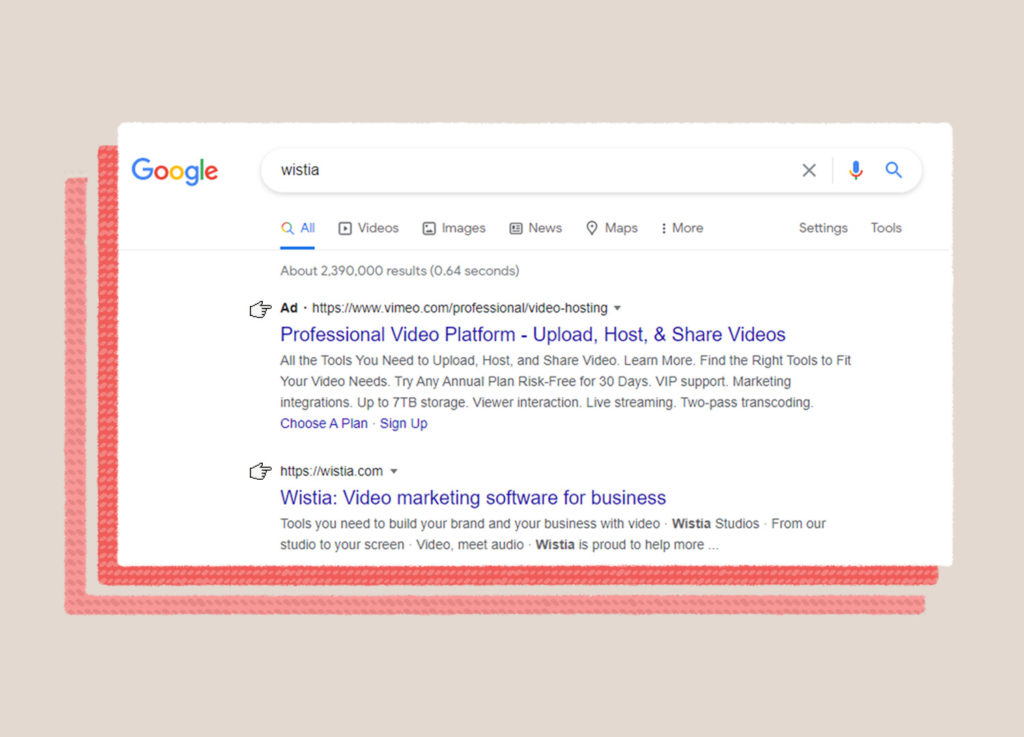
What Does PPC Stand For?
PPC means pay-per-click, an online advertising model that allows business owners to pay when someone clicks on their ad. Unlike other online advertising models, with PPC, advertisers are charged for something more valuable than reach and impressions: a visit to their landing page or website.
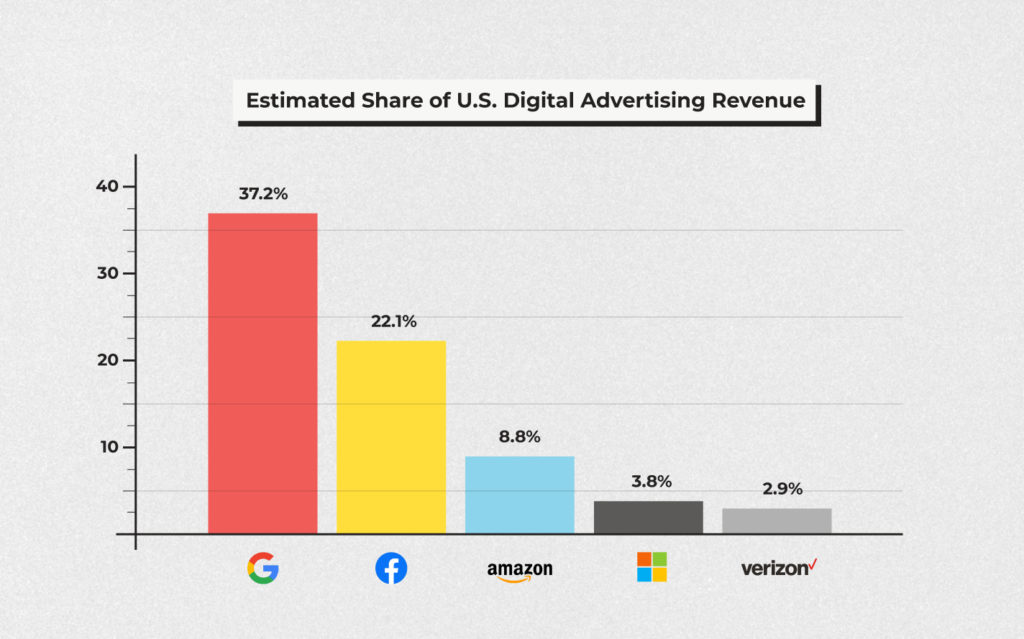
Nowadays, many ad platforms use PPC as their primary advertising models, such as Facebook Ads, Microsoft Advertising, LinkedIn Ads, and Google Ads (a.k.a Google AdWords), the latter being the most popular among those investing in paid ads.
How Does PPC Advertising Work?
Pay-per-click is somewhat uncharted territory for many newcomers less familiar with search engine marketing and paid search strategies.
Understanding how PPC ads work and getting acquainted with some of the industry’s terms will enable you to launch highly targeted advertising campaigns that help you achieve ROI while also having colossal budget savings.
Campaign Structure
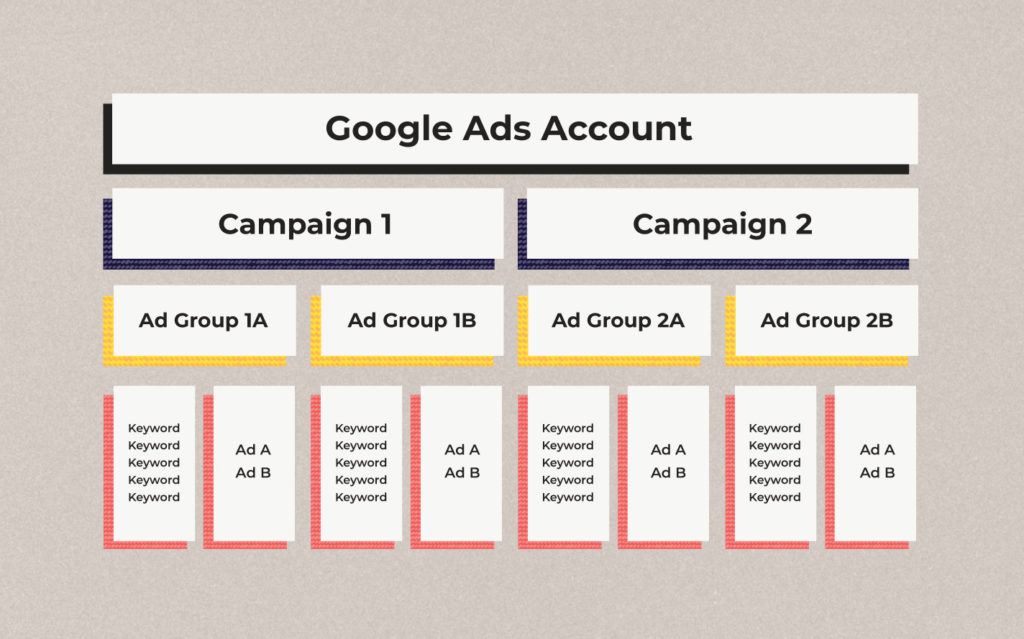
Ad
An ad is what users see when searching on Google. Your ad copy and format are crucial for attracting prospective customers to your website or landing page.
As shown in the Vimeo and Wistia example earlier, when people search online, they first see advertisers’ PPC ads, Google My Business results, and local organic results.
Keywords
Like SEO, keywords are the glue that keeps PPC ads relevant to what users are searching for online. Pay-per-click account managers use keywords to indicate when Google should display its ads.
For example, suppose you set a legal PPC campaign on Google Ads. In that case, your keyword strategy tells the machine: “Hey Google, I want to display my ads when people search for the term family lawyers near Charlotte, North Carolina.”
In this example, the user’s search query “lawyers near Charlotte, North Carolina” matches the campaign’s keyword strategy, ensuring your ads are relevant.
Ad Group
Organizing keywords in different groups creates a structure in pay-per-click. As a best practice, each campaign should contain a maximum of three tightly themed ad groups. Thus, increasing the ads’ quality and enabling more relevant and effective ads and landing pages.
For example, here’s how a roofer should group their keywords. Similarly, advertisers in different industries should group ad groups per product/service.
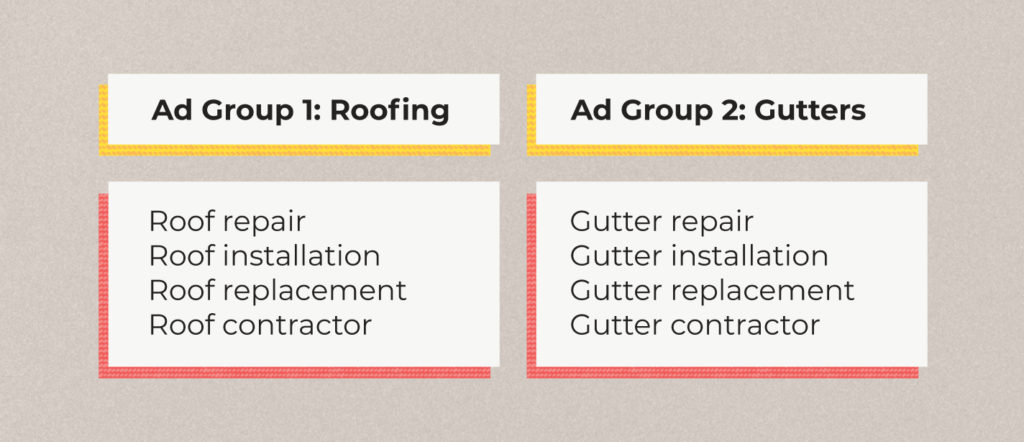
Campaign
A Google AdWords account can have multiple campaigns. Each campaign should be tailored for a specific goal (e.g., brand awareness, lead generation,) service area, service/product type, network (e.g., Google Search, Google Display, Google Shopping), and/or stage of the marketing funnel.
For example, you can have one campaign targeting users in the awareness stage of the marketing funnel with general keywords such as “roofer near me,” “roofers,” “roofing contractor.” And, another campaign for people in the consideration stage of the funnel with long-tail, specific keywords such as “GAF certified roofer near me,” “metal roofing installer near me.” Similarly, if you serve clients in different States, you can have separate campaigns to target each State.
Budgets & Bids
While you may think these terms can be interchangeable, there are some slight differences between the two. Your budget refers to your spending at the campaign level. In contrast, your bids refer to your expenditures at the ad group and keyword level.
Having budgets and bids at the campaign and ad group/keyword level, respectively, enables higher control over your overall budget.
For example, let’s say you are a roofer advertising on Google Ads. You have a campaign with two ad groups, one targeting the metropolitan area and another targeting three smaller, nearby towns. You want to spend 80% of your budget on the ad group targeting the metro area because that is where most of your clients live. At the same time, you want to bid higher on the keywords with the term “near me. (e.g., ‘roof installation near me’).”
Setting your bids at the ad group and keyword level will allow you to spend your campaign budget accordingly.
Cost-Per-Click, Cost-Per-Acquisition, and Conversions
As the term suggests, your cost-per-click (CPC) is how much you pay when someone clicks on your Google ad.
On the other hand, your conversions and cost-per-acquisition (CPA) are related to users’ activity once they land at your site. Your conversions are the number of users that fill out a form, book a demo, call, or purchase a product after clicking on your PPC ad. At the same time, your cost-per-acquisition is the price you pay per conversion.
These PPC metrics are monitored through tracking codes installed on your landing page or website. Conversion tracking enables you to make intelligent business decisions based on your goals and ROI.
Click-Through Rate
Like SEO, click-through rate is the percentage of people who click on your ad after seeing it. It’s calculated by dividing the total number of ad clicks by the total number of impressions your ad had.
Quality Score
Besides considering your keyword bidding strategy, Google requires a high-quality score to display your ad on the top of the Search Engine Results Page.
The following factors determine your quality score
- Your click-through rate (CTR).
- How tightly-themed your ad groups are.
- Your landing page experience
- The quality of your ad copy
- Your historical Google Ads account performance.
The Google Ads Auction
Google Ads runs an auction to determine which ads are eligible to be displayed every time someone searches.
When someone searches on Google, the platform reviews all ads whose keywords match that search, discards disapproved ads, and runs an auction with the remaining ads.
During the auction, Google considers the ad’s quality score, ad extensions, ad format impact, and keyword bidding strategy.
Google AdWords rewards advertisers for delivering a high-quality experience to users, displaying their ads at the top of the search results at a cheaper CPC.
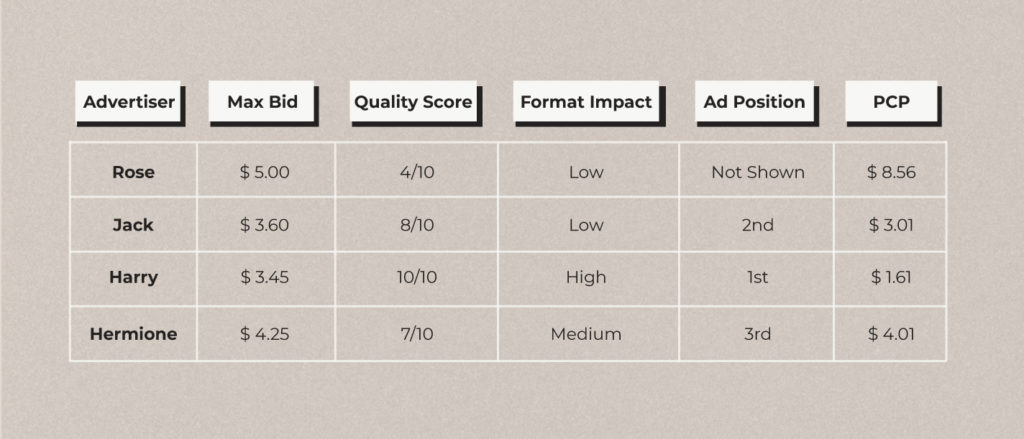
In other words, if your keyword bids and your ads’ quality score are competitive, your PPC ad is more likely to be displayed at a higher position and lower price.
Generating Leads Through Local PPC
Local PPC allows small businesses to display Google ads without breaking their bank account. With pay-per-click, advertisers can implement highly granular targeting strategies. These strategies enable them to segment users by their demographics, historical purchase/search behavior, location, content keywords, among other targeting options.
The more accurate and detailed your PPC targeting strategy is, the higher your chances of paying for clicks that will convert. You can get quality over quantity while saving money on clicks from users not ready to contact you.
Conclusion
To sum up, PPC allows your business’ ads to display above the organic search results. This doesn’t mean that you should stop investing in SEO. Instead, combine both strategies to gain complete visibility.
With SEO, you’ll have a marketing strategy that sets you for the long run. With PPC, you’ll give an extra push to users who are considering buying your service/product but, for some reason, haven’t contacted you.
PPC is complex and continually evolving. However, understanding the fundamentals of pay-per-click will set you up for success – whether you’re planning to manage Google Ads yourself or are considering hiring PPC management services.
If you want a professional assessment to successfully manage your Google Ads account, reach out to Olly Olly. We’ll answer all your questions and develop a winning PPC strategy for your small business. Also, feel free to peep our resources center and subscribe to our blog!
a

Article by Francis Espinoza
Francis is a Social Media Coordinator here at Olly Olly. Born and currently based in Nicaragua, her professional background and passion are all things inbound marketing.
Like what you read? Send Francis a message here.

